This Week in Freethought History (March 24-30)
Here’s your Week in Freethought History: This is more than just a calendar of events or mini-biographies – it’s a reminder that, no matter how isolated and alone we may feel at times, we as freethinkers are neither unique nor alone in the world.
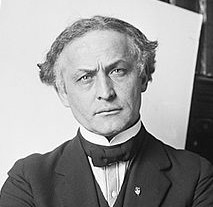 Last Sunday, March 24, but in 1874, American magician and escape artist Harry Houdini was born. During his storied career, Houdini (born Erich Weiss into a Hungarian Jewish family) struck up an unlikely friendship with Sherlock Holmes creator Sir Arthur Conan Doyle. Some of this was dramatized in the 1997 film, Fairy Tale: a True Story: even there, Houdini’s skepticism was apparent. Doyle was a devout believer in Spiritualism and his wife was a medium. At a séance, in which Mrs. Doyle used “automatic writing” to reach the spirit world, Houdini’s lately deceased, orthodox Jewish mother apparently made the sign of the cross and wrote an effusive message to Houdini, in English – a language she never understood while alive! Houdini had the desire to believe, but the facts kept getting in his way. He crusaded for 13 years against phony spirit mediums. As their friendship inevitably deteriorated, Houdini wrote to Doyle, “I know you treat this as a religion, but personally I cannot do so, for, up to the present time, and with all my experiences, I have never seen or heard anything that could really convert me.”
Last Sunday, March 24, but in 1874, American magician and escape artist Harry Houdini was born. During his storied career, Houdini (born Erich Weiss into a Hungarian Jewish family) struck up an unlikely friendship with Sherlock Holmes creator Sir Arthur Conan Doyle. Some of this was dramatized in the 1997 film, Fairy Tale: a True Story: even there, Houdini’s skepticism was apparent. Doyle was a devout believer in Spiritualism and his wife was a medium. At a séance, in which Mrs. Doyle used “automatic writing” to reach the spirit world, Houdini’s lately deceased, orthodox Jewish mother apparently made the sign of the cross and wrote an effusive message to Houdini, in English – a language she never understood while alive! Houdini had the desire to believe, but the facts kept getting in his way. He crusaded for 13 years against phony spirit mediums. As their friendship inevitably deteriorated, Houdini wrote to Doyle, “I know you treat this as a religion, but personally I cannot do so, for, up to the present time, and with all my experiences, I have never seen or heard anything that could really convert me.”
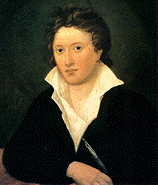 Last Monday, March 25, but in 1811, Oxford University student Percy Bysshe Shelley was expelled for publishing the pamphlet “The Necessity of Atheism.” The University’s fellows demanded that he deny authorship. This Shelley refused to do. Thinking it too dangerous for Shelley to pursue truth at a university, the administration at Oxford expelled him. What was so dangerous about “The Necessity of Atheism”? In it, Shelley made a number of claims. One is that beliefs are involuntary, and, therefore, since atheists cannot choose to be “without god” (the literal definition of atheism), they should not be persecuted. Another echoed the observation of God made by Baron d’Holbach: “IF HE HAS SPOKEN, WHY IS THE UNIVERSE NOT CONVINCED?” So unchastened was Shelley by his expulsion, that he published a revised and expanded version of “The Necessity of Atheism” in 1813. All this seems not to have injured in the slightest Shelley’s later literary success. He once said, “It is easier to suppose that the universe has existed for all eternity than to conceive a being beyond its limits capable of creating it.” And Percy Bysshe Shelley perhaps anticipated what we today call the “God of the Gaps” when he wrote, “If ignorance of nature gave birth to gods, knowledge of nature is made for their destruction.”
Last Monday, March 25, but in 1811, Oxford University student Percy Bysshe Shelley was expelled for publishing the pamphlet “The Necessity of Atheism.” The University’s fellows demanded that he deny authorship. This Shelley refused to do. Thinking it too dangerous for Shelley to pursue truth at a university, the administration at Oxford expelled him. What was so dangerous about “The Necessity of Atheism”? In it, Shelley made a number of claims. One is that beliefs are involuntary, and, therefore, since atheists cannot choose to be “without god” (the literal definition of atheism), they should not be persecuted. Another echoed the observation of God made by Baron d’Holbach: “IF HE HAS SPOKEN, WHY IS THE UNIVERSE NOT CONVINCED?” So unchastened was Shelley by his expulsion, that he published a revised and expanded version of “The Necessity of Atheism” in 1813. All this seems not to have injured in the slightest Shelley’s later literary success. He once said, “It is easier to suppose that the universe has existed for all eternity than to conceive a being beyond its limits capable of creating it.” And Percy Bysshe Shelley perhaps anticipated what we today call the “God of the Gaps” when he wrote, “If ignorance of nature gave birth to gods, knowledge of nature is made for their destruction.”
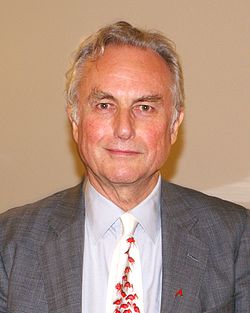 Last Tuesday, March 26, but in 1941, British evolutionary biologist Richard Dawkins was born. As he describes it, Dawkins had “a normal Anglican upbringing.” Coming out as an atheist and a humanist in his 1986 book, The Blind Watchmaker, Dawkins argued against the watchmaker analogy (first proposed by William Paley in 1802), a teleological argument that supposedly proved the existence of God from the order and complexity of the universe, much like a watchmaker can be inferred from the order and complexity of a watch. But it was with the 2006 book that outsold all his others, The God Delusion, that Dawkins became known as “the UK’s Chief Atheist” and “Darwin’s Rottweiler.” Dawkins argues that the proofs of God are so unconvincing that belief in God qualifies as a delusion. He then goes on to demolish the idea of religion itself, as useless in morality, as subversive of science, and as mental abuse of children. Says Dawkins, “It has become almost a cliché to remark that nobody boasts of ignorance of literature, but it is socially acceptable to boast ignorance of science and proudly claim incompetence in mathematics” and “One of the things that is wrong with religion is that it teaches us to be satisfied with answers which are not really answers at all.”
Last Tuesday, March 26, but in 1941, British evolutionary biologist Richard Dawkins was born. As he describes it, Dawkins had “a normal Anglican upbringing.” Coming out as an atheist and a humanist in his 1986 book, The Blind Watchmaker, Dawkins argued against the watchmaker analogy (first proposed by William Paley in 1802), a teleological argument that supposedly proved the existence of God from the order and complexity of the universe, much like a watchmaker can be inferred from the order and complexity of a watch. But it was with the 2006 book that outsold all his others, The God Delusion, that Dawkins became known as “the UK’s Chief Atheist” and “Darwin’s Rottweiler.” Dawkins argues that the proofs of God are so unconvincing that belief in God qualifies as a delusion. He then goes on to demolish the idea of religion itself, as useless in morality, as subversive of science, and as mental abuse of children. Says Dawkins, “It has become almost a cliché to remark that nobody boasts of ignorance of literature, but it is socially acceptable to boast ignorance of science and proudly claim incompetence in mathematics” and “One of the things that is wrong with religion is that it teaches us to be satisfied with answers which are not really answers at all.”
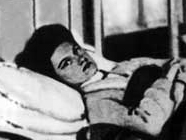 Last Wednesday, March 27, but in 1915, Mary Mallon, the Irish-born food service worker who became notorious as “Typhoid Mary,” was put into her final quarantine. In fact, Mary infected only thirty-three people, and only three of them died. But Mary Mallon’s career as a typhoid carrier is illustrative of the ill-educated, superstitious mindset of those who trust in Divine Providence over science and empiricism – even today. What could have defeated Typhoid Mary, and many of the epidemics of the past and near-present, was simple sanitation. And what prevented humankind from saving lives through sanitation? It was religion, and its reliance on superstition, as opposed to reliance on the scientific method with its reproducibility of results independent of your belief. And what stopped science from developing when it was most needed? The answer is not irreducibly complex: there was more profit in the prophets, more cash in creeds, more salvation in sickness than in health, and more truth than poetry in the statement that “pestilences are the harvests of the ministers of God” – regardless of the harm to humanity. The medieval answer to disease and pestilence was fetishism – the belief in an inherent value or powers possessed by an object, such as body parts of saints, healing waters, pieces of the true cross, holy shrouds, and so on. So Mary’s belief in Providence rather than prevention had a long, dreadful pedigree. Typhoid Mary’s story is not only an argument in favor of good sanitation, something unknown in the Bible, the Qu’ran or any other holy book – it is also an answer to the question, “What’s the harm in superstition?”
Last Wednesday, March 27, but in 1915, Mary Mallon, the Irish-born food service worker who became notorious as “Typhoid Mary,” was put into her final quarantine. In fact, Mary infected only thirty-three people, and only three of them died. But Mary Mallon’s career as a typhoid carrier is illustrative of the ill-educated, superstitious mindset of those who trust in Divine Providence over science and empiricism – even today. What could have defeated Typhoid Mary, and many of the epidemics of the past and near-present, was simple sanitation. And what prevented humankind from saving lives through sanitation? It was religion, and its reliance on superstition, as opposed to reliance on the scientific method with its reproducibility of results independent of your belief. And what stopped science from developing when it was most needed? The answer is not irreducibly complex: there was more profit in the prophets, more cash in creeds, more salvation in sickness than in health, and more truth than poetry in the statement that “pestilences are the harvests of the ministers of God” – regardless of the harm to humanity. The medieval answer to disease and pestilence was fetishism – the belief in an inherent value or powers possessed by an object, such as body parts of saints, healing waters, pieces of the true cross, holy shrouds, and so on. So Mary’s belief in Providence rather than prevention had a long, dreadful pedigree. Typhoid Mary’s story is not only an argument in favor of good sanitation, something unknown in the Bible, the Qu’ran or any other holy book – it is also an answer to the question, “What’s the harm in superstition?”
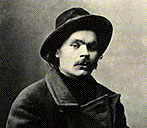 Last Thursday, March 28, but in 1868, Russian writer Maxim Gorky (Максим Горький) was born. In spite of poor education, Gorky’s photographic memory and humanitarian sentiments launched him into preeminence as a short-story writer, novelist and playwright. His politics also got him into trouble with the Tsarist authorities, who were supported by the Russian Orthodox Church. Gorky had a contempt for all religion, but also supported the Soviet state. In one essay, Gorky wrote, “Paradise is one of the crass fictions invented by high-priests and fathers of the Church, a fiction whose purpose is to requite the hellish torments of people on earth with the soap-bubble of a hope of peace in another place.” In a 1928 speech to a convention of a group in Moscow that was actually called the “Belligerent Irreligionists,” Gorky said, “It is clear that there is no place for religion in this huge process of cultural building which is developing so fast in this country. Our goal is not to ruin churches; our goal is to arrange that people forget about them… Who created gods? We did.”
Last Thursday, March 28, but in 1868, Russian writer Maxim Gorky (Максим Горький) was born. In spite of poor education, Gorky’s photographic memory and humanitarian sentiments launched him into preeminence as a short-story writer, novelist and playwright. His politics also got him into trouble with the Tsarist authorities, who were supported by the Russian Orthodox Church. Gorky had a contempt for all religion, but also supported the Soviet state. In one essay, Gorky wrote, “Paradise is one of the crass fictions invented by high-priests and fathers of the Church, a fiction whose purpose is to requite the hellish torments of people on earth with the soap-bubble of a hope of peace in another place.” In a 1928 speech to a convention of a group in Moscow that was actually called the “Belligerent Irreligionists,” Gorky said, “It is clear that there is no place for religion in this huge process of cultural building which is developing so fast in this country. Our goal is not to ruin churches; our goal is to arrange that people forget about them… Who created gods? We did.”
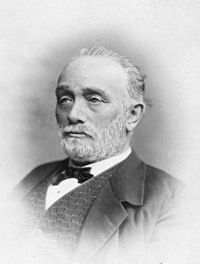 Yesterday, March 29, but in 1824, German philosopher, physiologist and physician Ludwig Büchner was born. He was educated in physics, chemistry, botany, mineralogy and philosophy at Gießen and studied pathology with the great Rudolf Virchow. Although he would describe himself as a Monist (like Ernst Haeckel), Büchner was deprived of his medical professorship at Tübingen University for writing his famous book, Force and Matter (1855), due to the extreme materialism of the work. Nevertheless, this “Bible of Materialism” sold hundreds of thousands of copies in various languages and was greatly influential in Europe. In it, he wrote, “What we still designate as chance, merely depends on a concatenation of circumstances, the internal connection and final causes of which we have as yet been unable to unravel.” As for religion and morality, here is what Büchner observed in Force and Matter, “For morality… is not innate or implanted by a higher power in the mind of each individual in the form of definite moral precepts, but it is acquired by long practice and experience. … Nor is morality the outcome of religion or of definite precepts derived from faith; for experience has proved that the most religious ages and nations have not always been the most moral. … Is it not a fact that in the very countries in which the Church holds an undisputed sway and no freedom of thought is tolerated, a very much lower standard of morality prevails to this day than in those in which enlightenment has raised its victorious banner?”
Yesterday, March 29, but in 1824, German philosopher, physiologist and physician Ludwig Büchner was born. He was educated in physics, chemistry, botany, mineralogy and philosophy at Gießen and studied pathology with the great Rudolf Virchow. Although he would describe himself as a Monist (like Ernst Haeckel), Büchner was deprived of his medical professorship at Tübingen University for writing his famous book, Force and Matter (1855), due to the extreme materialism of the work. Nevertheless, this “Bible of Materialism” sold hundreds of thousands of copies in various languages and was greatly influential in Europe. In it, he wrote, “What we still designate as chance, merely depends on a concatenation of circumstances, the internal connection and final causes of which we have as yet been unable to unravel.” As for religion and morality, here is what Büchner observed in Force and Matter, “For morality… is not innate or implanted by a higher power in the mind of each individual in the form of definite moral precepts, but it is acquired by long practice and experience. … Nor is morality the outcome of religion or of definite precepts derived from faith; for experience has proved that the most religious ages and nations have not always been the most moral. … Is it not a fact that in the very countries in which the Church holds an undisputed sway and no freedom of thought is tolerated, a very much lower standard of morality prevails to this day than in those in which enlightenment has raised its victorious banner?”
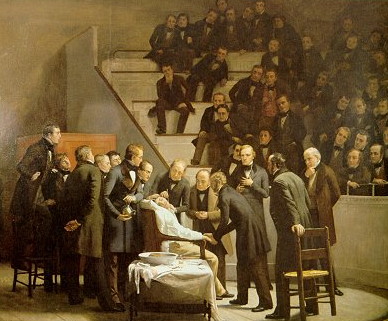 Today, March 30, but in 1842, ether was first used as an anesthetic during surgery by Dr. Crawford W. Long of Jefferson, GA. The controversy over the use of anesthetics has a sad history of church opposition, especially when suggested for women in childbirth. Although anesthetics were known to ancient civilizations, the rather obvious practice of anesthetizing people before committing surgery on them was discontinued during the Middle Ages, the period of strongest Church influence. When James Young Simpson, a Scots physician, advocated the use of chloroform as an anesthetic in obstetrical cases in 1847, the idea was denounced from pulpits across the land as impious and contrary to Holy Writ. Clergymen accused Simpson of attempting “to avoid one part of the primeval curse on woman.” But Simpson knew his Bible and pointed to Genesis 2:21: “And the Lord God caused a deep sleep to fall upon Adam, and he slept: and he took one of his ribs, and closed up the flesh instead thereof;” thereby demonstrating that even God used anesthesia!
Today, March 30, but in 1842, ether was first used as an anesthetic during surgery by Dr. Crawford W. Long of Jefferson, GA. The controversy over the use of anesthetics has a sad history of church opposition, especially when suggested for women in childbirth. Although anesthetics were known to ancient civilizations, the rather obvious practice of anesthetizing people before committing surgery on them was discontinued during the Middle Ages, the period of strongest Church influence. When James Young Simpson, a Scots physician, advocated the use of chloroform as an anesthetic in obstetrical cases in 1847, the idea was denounced from pulpits across the land as impious and contrary to Holy Writ. Clergymen accused Simpson of attempting “to avoid one part of the primeval curse on woman.” But Simpson knew his Bible and pointed to Genesis 2:21: “And the Lord God caused a deep sleep to fall upon Adam, and he slept: and he took one of his ribs, and closed up the flesh instead thereof;” thereby demonstrating that even God used anesthesia!
Other birthdays and events this week—
March 24: English socialist, poet and artist William Morris was born (1834).
March 27: French poet, playwright, and novelist Alfred de Vigny was born (1797).
March 27: The future 14th Premier of New Zealand, John Ballance, was born (1839).
March 28: American philosopher, writer and cognitive scientist Daniel Dennett was born (1942).
March 29: the chief successor of Marx in Germany, Wilhelm Liebknecht was born (1826).
We can look back, but the Golden Age of Freethought is now. You can find full versions of these pages in Freethought history at the links in my blog, FreethoughtAlmanac.com.

